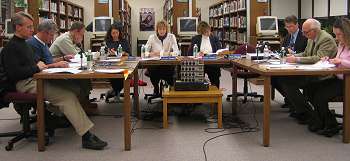- By Richard Meagher
- News
 Print
Print After nearly two hours of reviewing feedback from the ad-hoc committee, an overhead presentation of the online survey results and listening to many residents and some teachers, each board trustee responded and agreed that any proposition on the table most likely will be voted down in the spring. The surveys showed very little support for any tax increases and the feedback from many residents was largely not in favor of supporting any of the propositions as defined.
Some residents complained that there was very little communication on this project; many of them who came to the Feb 6th meeting only just found out why the special meeting was being held. This became the underlying reason for the board’s decision to not go forward and vote on the referendum next week. Lansing’s new superintendent Dr. Mark Lewis and board president Bonita Lindberg both spoke of bringing about more awareness and better communication of the district’s plans and proposals to the community. There will be more discussions at the regular board meetings in the next few weeks and Dr. Lewis plans to have a timetable for the next referendum by Feb 27th meeting.
 School Board Members (left to right) Dan Brown, Tom Keane, Glen Swanson, Christine Iacobucci, Vice President Anne Drake, President Bonita Lindberg, Superintendent Mark Lewis, Interim Business Administrator Larry Driscoll, Secretary Jodi Rusaw |
While the board’s decision to hold off putting the project on its agenda for next week was a relief to many residents, a look of defeat was clearly evident in the faces of teachers and faculty who have pleaded for an urgent need to renovate and add more space so they can deliver and add more academic programs and to insure the health and safety of the student population.
Lansing principals Michelle Stone from the high school and John Gizzi from the middle school both gave tours of their buildings and provided a lot of insight to the daily student life and the challenges they face with buildings in need of upgrading, repair and expansion. They spoke of constant juggling of academic schedules to find enough classroom space to meet new mandates and requirements from the New York State Board of Education that in many cases exceeds the available capacity for meeting these requirements. One teacher complained of how she has to share a small kitchen with another faculty member for office space and has to cart her teaching materials from room to room between classes. She also spoke of poor acoustics and sound proofing in the high school classrooms, making it difficult for students not to be distracted by other classes in session.
The delay may end up being a costly one for residents. With no vote on any proposition likely before next school term, the board’s decision will push back any construction by at least one year, potentially adding 5% to 10% to the current cost proposals each year it is delayed, according to Kirk Narburgh from King & King Architects, the firm selected by the school district to manage the planning and design work for the project.
Presenting any tax proposal, given the current economic climate and the double-digit increases in property assessments over the past few years would face a lot of scrutiny and most likely be defeated. A case in point is the vote on the Ithaca school district library tax which was overwhelmingly rejected by 65% of the voters Tuesday night. In contrast to Lansing’s capital project cost of $234 a year for a home assessed at $100,000 in Lansing, the library’s proposed tax was only $17 per year for the same assessment in Ithaca.
Pushing back the date for a referendum may increase its chance of success later in the year. In response to complaints of little or no communication on the project by some residents at the meeting Lansing board trustee Dan Brown reminded the attendees that the board meetings have always been open to the public yet attended by only a few. He said the community needs to make an effort to get involved by attending more board meetings and being an active voice in the decisions that the board makes, otherwise, as one trustee says “we all may end up living with what the board decides”. The large attendance at Monday’s meeting proved his point.
----
v2i6



